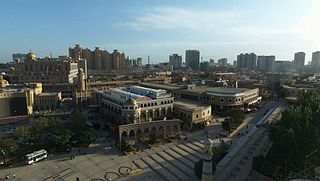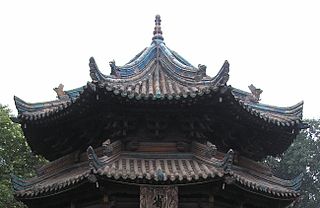
The Uyghurs, alternately Uygurs, Uighurs or Uigurs, are a Turkic minority ethnic group originating from and culturally affiliated with the general region of Central and East Asia. The Uyghurs are recognized as native to the Xinjiang Uyghur Autonomous Region in Northwest China. They are considered to be one of China's 55 officially recognized ethnic minorities. The Uyghurs are recognized by the Chinese government only as a regional minority within a multicultural nation. The Chinese government rejects the notion of the Uyghurs being an indigenous group.

The Kara-Khanid Khanate also known as the Karakhanids, Qarakhanids, Ilek Khanids. or the Afrasiabids, was a Turkic khanate that ruled Central Asia in the 9th through the early 13th century. The dynastic names of Karakhanids and Ilek Khanids refer to royal titles with Kara Kağan being the most important Turkish title up till the end of the dynasty.

The Uyghur or Uighur language, is a Turkic language with 10 to 15 million speakers, spoken primarily by the Uyghur people in the Xinjiang Uyghur Autonomous Region of Western China. Significant communities of Uyghur speakers are located in Kazakhstan, Kyrgyzstan and Uzbekistan and various other countries have Uyghur-speaking expatriate communities. Uyghur is an official language of the Xinjiang Uyghur Autonomous Region and is widely used in both social and official spheres, as well as in print, television and radio and is used as a common language by other ethnic minorities in Xinjiang.

The Tarim Basin is an endorheic basin in northwest China occupying an area of about 1,020,000 km2 (390,000 sq mi). Located in China's Xinjiang region, it is sometimes used synonymously to refer the southern half of the province, or Nanjiang, as opposed to the northern half of the province known as Dzungaria or Beijiang. Its northern boundary is the Tian Shan mountain range and its southern boundary is the Kunlun Mountains on the edge of the Tibetan Plateau. The Taklamakan Desert dominates much of the basin. The historical Uyghur name for the Tarim Basin is Altishahr, which means "six cities" in Uyghur.

The First East Turkistan Republic, officially the Islamic Republic of East Turkistan (IRET), was a short-lived breakaway would-be Islamic republic founded on 12 November 1933. It was centred on the city of Kashgar in what is today China-administered Xinjiang Uyghur Autonomous Region. The ETR was primarily the product of an independence movement of the Uyghur population living there, and more broadly of Turkic-ethnicity in character, including Kyrgyz and other Turkic peoples in its government and its population.

Mahmud ibn Hussayn ibn Muhammed al-Kashgari was an 11th-century Kara-Khanid scholar and lexicographer of the Turkic languages from Kashgar.

Upal is a town in Shufu County in western Xinjiang, China.

Afaq Khoja, also known as Apaq Xoja or more properly Āfāq Khwāja, was a religious and political leader with the title of Khwaja in Kashgaria. He was also known as Khwāja Hidāyat Allāh.
Sultan Said Khan ruled the Yarkent Khanate from September, 1514, to July, 1533. He was born in 1487 in Moghulistan and was a direct descendant of the first Moghul Khan, Tughlugh Timur, who had founded the state of Moghulistan in 1348. The Moghuls were turkicized Mongols who had converted to Islam.

Kashgar Airport, also known as Kashi Airport, is an airport serving Kashgar, a city in Uyghur autonomous region of Xinjiang in the People's Republic of China.
Wali Khan was a member of the Ak Taghliq clan of East Turkestan Khojas, who invaded Kashgaria from the Kokand during the Afaqi Khoja revolts on several occasions in the 1850s, and succeeded in ruling Kashgar for a short while.
The Yagmas, or Yaghmas, were a medieval tribe of Turkic people that came to the forefront of history after the disintegration of the Western Turkic Kaganate. They were one component of a confederation which consisted of Yagma, the Karluks, the Chigils and other tribes which founded the Kara-Khanid Khanate. From the seventh century until the Karakhanid period, the Yagma were recorded in Arabic, Persian, and Chinese accounts as a prominent and powerful political entity in the Tarim Basin, Dzungaria, and Jeti-su.

Kashgar, also Kashi, is an oasis city in Xinjiang. It is one of the westernmost cities of China, near the border with Afghanistan, Kyrgyzstan, Tajikistan, India and Pakistan. With a population of over 500,000, Kashgar has served as a trading post and strategically important city on the Silk Road between China, the Middle East and Europe for over 2,000 years.
There is a small community of Uyghurs in Pakistan, originating from the Xinjiang autonomous region of China.
Uyghur nationalist historians in the People's Republic of China and the United States posit that the Uyghur people is millennia-old and can be divided into four distinct phases: Pre-Imperial, Imperial, Idiqut, and Mongol, with perhaps a fifth modern phase running from the death of the Silk Road in AD 1600 until the present. In brief, Uyghur history is the story of a small nomadic tribe from the Altai Mountains competing with rival powers in Central Asia, including other Altaic tribes, Indo-European empires from the south and west and Sino-Tibetan empires to the east. After the collapse of the Uyghur Khaganate in AD 840, ancient Uyghur resettled from Mongolia to the Tarim Basin, assimilating the Indo-European population, which had previously been driven out of the region by the Xiongnu. Ultimately, the Uyghurs became civil servants administering the Mongol Empire.

The 2011 Kashgar attacks were a series of knife and bomb attacks in Kashgar, Xinjiang, China on July 30 and 31, 2011. On July 30, two Uyghur men hijacked a truck, killed its driver, and drove into a crowd of pedestrians. They got out of the truck and stabbed six people to death and injured 27 others. One of the attackers was killed by the crowd; the other was brought into custody. On July 31, a chain of two explosions started a fire at a downtown restaurant. A group of armed Uyghur men killed two people inside of the restaurant and four people outside, injuring 15 other people. Police shot five suspects dead, detained four, and killed two others who initially escaped arrest.
Ibrahim Muti'i was a well-known linguist from Xinjiang, China. He is best known for his research on Uyghur language and culture. He is considered to have been one of the top scholars of his generation in Uyghur.

Qocho, also known as Idiqut, was a Uyghur kingdom created in 843, with strong Chinese Buddhist and Tocharian influences. It was founded by Uyghur refugees fleeing the destruction of the Uyghur Khaganate after being driven out by the Yenisei Kirghiz. They made their summer capital in Qocho and winter capital in Beshbalik. Its population is referred to as the "Xizhou Uyghurs" after the old Tang Chinese name for Gaochang, the Qocho Uyghurs after their capital, the Kucha Uyghurs after another city they controlled, or the Arslan (lion) Uyghurs after their king's title.

Xinjiang under Qing rule refers to the Qing dynasty's rule over Xinjiang from the late 1750s to 1912. In the history of Xinjiang, the Qing rule was established in the final phase of the Dzungar–Qing Wars when the Dzungar Khanate was conquered by the Qing dynasty established by the Manchus in China, and lasted until the fall of the Qing dynasty in 1912. The post of General of Ili was established to govern the whole of Xinjiang and reported to the Lifan Yuan, a Qing government agency that oversaw the empire's frontier regions. Xinjiang was turned into a province in 1884.

The historical area of what is modern day Xinjiang consisted of the distinct areas of the Tarim Basin and Dzungaria, and was populated by Indo-European Tocharians and Saka peoples, who practiced Buddhism. They came under Chinese rule in the Han dynasty as the Protectorate of the Western Regions due to wars between the Han dynasty and the Xiongnu and again in the Tang dynasty as the Protectorate General to Pacify the West due to wars between the Tang dynasty and the Turkic Khaganates. The Tang dynasty withdrew its control of Xinjiang in the Protectorate General to Pacify the West and the Four Garrisons of Anxi after the An Lushan Rebellion, after which the Turkic peoples living in the area converted to Islam.













